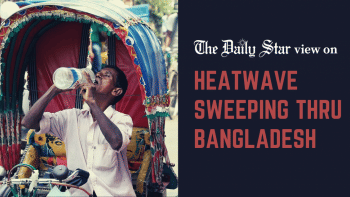Drop in life expectancy an ominous sign

It is disheartening to know that the average life expectancy of Bangladeshis went down by six months to 72.3 years in 2021. Even though it might not be a big drop statistically, it illustrates that people's living conditions have deteriorated in recent times. According to a former chairperson of Dhaka University's population sciences department, the impact of Covid-19 and its post-effects, including reduced access to healthcare facilities, poverty, reduced intake of notorious food, and lifestyle, could be the reasons for the decline in life expectancy and the simultaneous rise in crude death rate, which increased from 5.1 per thousand people to 5.7.
According to data, men's life expectancy declined more than women's. In 2021, men's life expectancy came down to 70.6 years from 71.2 years, and women's from 74.5 years to 74.1 years. The study also revealed an increase in the maternal mortality rate in 2021, with 168 maternal mortalities reported per lakh childbirths. Since the beginning of Covid until now, life has gotten harder for most people in the country due to numerous disruptions to essential services. Prices have continually kept on rising, with inflation hitting record highs at various times. This has forced many people to change their daily diets, including by cutting down on protein and other nutritious food.
The inability of people to afford the same quality of diet they once did is surely going to have a significant effect on their long-term health. Additionally, the mental stress that they are experiencing due to the rising cost of living and from various uncertainties, as well as increased unemployment post-Covid, could also be factors affecting their life expectancy. Another reason which is likely contributing to it is the quality of air that those living in places like Dhaka are having to breathe day in and day out. A few recent studies have also confirmed this.
High levels of depression, a sense of hopelessness and stress are all known reasons that lead to a decline in people's life expectancy. According to the 2022 Global Emotions Report, Bangladesh ranked seventh among the world's angriest, saddest and most stressed nations. In the World Happiness Report 2023, Bangladesh slipped 24 notches to rank 118th out of 137 countries, which shows Bangladeshis have become less happy in recent times. All of these are connected factors that are affecting people's life expectancy.
The increased uncertainty and a sense of overall injustice in the country, decreased security – including financial security amidst rising inflation and declining savings and sources of incomes – coupled with greater squalor and other poor environmental factors are all leading our citizens to become more miserable, stressed, unhealthy and likely to live shorter lives than a few years ago. All this shows that the country is, in large parts, heading in the wrong direction. We urge the authorities to address the underlying reasons behind it and rectify them for the sake of a happier and longer life for citizens.


 For all latest news, follow The Daily Star's Google News channel.
For all latest news, follow The Daily Star's Google News channel. 








Comments